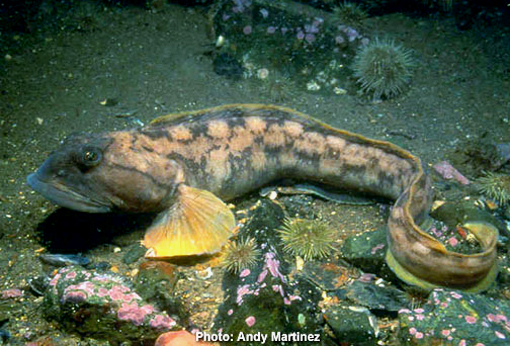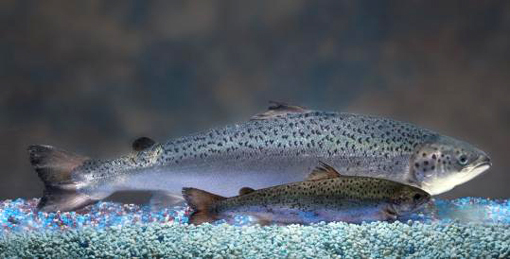You are hereBlogs / WcP.Common.Sense's blog / Fishing industry & 39 lawmakers' concerns: modified salmon with gene from eel-like ocean pout..seafood's highly allergenic
Fishing industry & 39 lawmakers' concerns: modified salmon with gene from eel-like ocean pout..seafood's highly allergenic




(quote)
Senator Mark Begich (D-Alaska): Serious health and environmental questions regarding the fish cannot be adequately evaluated by the public, Begich wrote. Led by Sen. Mark Begich (D-Alaska), the senators complained to FDA Commissioner Margaret A. Hamburg that the agency is using the wrong process for evaluating the safety of the modified fish and that the public is being left out.
The fish, named the AquAdvantage salmon by the biotech company seeking federal approval to market it, is an Atlantic salmon that has been given a growth hormone from a Chinook salmon and a gene from an eel-like ocean pout, which allows it to grow twice as fast as a wild Atlantic salmon. It would be the first genetically modified animal approved for human consumption in the United States.
Begich said the FDA is incorrectly treating the request for approval of AquAdvantage salmon as if it were a new veterinary drug and not as a new animal that humans consume. Under the current process, the company is allowed to keep private some of the data it submits to the FDA on the grounds that it is classified business information.
Serious health and environmental questions regarding the fish cannot be adequately evaluated by the public, Begich wrote.
Other senators who signed the letter were Lisa Murkowski (R-Alaska), Patty Murray (D-Wash.), Bernard Sanders (I-Vt.), Maria Cantwell (D-Wash.), Ron Wyden (D-Ore.), Patrick J. Leahy (D-Vt.), Kirsten Gillibrand (D-N.Y.), Barbara Mikulski (D-Md.), Jeff Merkley (D-Ore.) and Jon Tester (D-Mont.).
CBS – Modified Salmon - the First Such Creature to Be Considered for Human Consumption. Critics’main concerns: Altered fish has never been eaten before, they say, it could include dangerous allergens, especially because seafood is highly allergenic. Patrons at a Washington, DC-area seafood had mixed feelings about the prospect of eating the genetically-modified fish - one yes, one maybe, and one "definitely no". In documents released ahead of the hearing, the FDA said there were no biologically relevant differences between the engineered salmon and conventional salmon, and there is a reasonable certainty of no harm from its consumption. FDA scientists speaking Monday said there are very few differences between the modified and conventional fish.
Critics have two main concerns: The safety of the food to humans and the salmon's effect on the environment.
Because the altered fish has never been eaten before, they say, it could include dangerous allergens, especially because seafood is highly allergenic. They also worry that the fish will escape and intermingle with the wild salmon population, which is already endangered. They would grow fast and consume more food to the detriment of the conventional wild salmon, the critics fear.
A wide range of environmental, food safety and consumer groups have argued that more public studies are needed and that the current FDA process is inadequate because it allows the company to keep some proprietary information private. Modified foods are regulated under the same process used for animal drugs.
"It is outrageous to keep this vital information secret," said Wenonah Hauter, director of the advocacy group Food & Water Watch. "Consumers have a right to know what FDA is trying to allow into our food supply."
Dr. Michael Hansen, senior scientist at Consumers Union, the publisher of Consumer Reports, says the agency is relying on too little data, much of which is supplied by the company itself.
European nations have been much more cautious in embracing engineered foods. Ruediger Rosenthal, a spokesman for Bund-Friends of the Earth Germany, said it is unlikely the modified fish would make it across the Atlantic for sale as many Europeans are very skeptical of genetically modified foods.
Before now, genetic engineering has been used widely in agriculture to make crops resistant to pests and herbicides, in the development of microbes to produce pharmaceuticals for human and animal use, and in food to produce microorganisms used in baking, brewing and cheesemaking. While various organizations have been working to develop genetically modified animals, such as the University of Guelph's "Enviropig" - which more easily digests plant phosphorous, thus excreting less of it into the environment - AquAdvantage® Salmon would be the first to be approved by the FDA for use as food.
The fish's rapid growth will be boosted by the injection of a combination of a growth gene (GH-coding sequences) from the Pacific Chinook salmon and genetic material (the AFP gene) from the ocean pout - a large, eel-like fish - into the fertilized eggs of Atlantic salmon, making the recombined DNA present in cells throughout the body of the fish. The Chinook gene promotes the growth to market size, and the pout gene allows the fish to grow in the winter as well as the summer.
AquaBounty Technologies claims the resultant fish are reproductively sterile due to another genetic alteration - triploidy - that eliminates the possibility of interbreeding amongst themselves or with other native breeds, while maintaining protection over intellectual property. The company will only sell female eggs and raise the fish within contained, inland systems. However, despite these assurances, the FDA indicates that up to 5% of the eggs may indeed be fertile, and the company's claims in this regard are "potentially misleading."
This analysis is entirely new ground for the FDA, and their Veterinary Medicine Advisory Committee is employing the regulations they would to evaluate veterinary pharmaceuticals, rather those used for than food safety. According to Section 5 of the group's overview of this engineered Atlantic salmon, "That rDNA construct meets the definition of a 'drug' under the Federal Food, Drug, and Cosmetic Act" as "an article intended to alter the structure or function of the body of man or animal."
Mark Begich, who is the U. S. Senator, along with 10 other senators is trying hard to stop the Food and Drug Administration (FDA) from giving a green signal to the consumption of genetically modified salmon (GM salmon). All the senators have sent a letter to the FDA mentioning that they and other fishing industries are against the approval of GM salmon. AquaBounty Technologies was supposed to produce the GM salmon by crossing the Atlantic salmon and a Chinook salmon, but the decision had been delayed by the FDA.
Begich referred to the GM salmon as `Frankenfish' and expressed worries about the safety of the product.
On Thursday, Sen. Lisa Murkowski, who is a Republican from Alaska, said that selling unlabeled and genetically altered salmon is dangerous and the FDA should strongly consider the pros and cons before giving green signal to the fish. Dale Kelley, who is the Director of the Alaska Trollers Association, said that labels are very necessary; otherwise one would not know what is being served on the plate.
The fishing industry and politicians from commercial-fishing states are mobilizing against a possible Food and Drug Administration approval of genetically modified salmon for the American dinner table. "Putting unlabeled, genetically altered salmon in the marketplace is simply irresponsible, and the FDA needs to strongly consider what impacts this will have before they approve this Frankenfish," Sen. Lisa Murkowski, a Republican from Alaska, said Thursday.
AquAdvantage contains a growth-hormone gene from another salmon that helps it grow twice as fast as conventional farmed fish.
A coalition that includes Pacific Coast trollers, Atlantic fishing companies and organic-yogurt maker Stonyfield Farm says the genetically altered salmon might threaten their livelihoods by spreading unease about salmon and other foods. "This stuff is not healthy for people, and it's not like our fresh fish," said Angela Sanfilippo, president of the Gloucester Fishermen's Wives Association of Massachusetts.
Ms. Sanfilippo's group and others have joined with 39 lawmakers who wrote to the FDA this week asking the agency to stop its approval process for the genetically modified salmon. They cited concerns about "human health and environmental risks" from the AquAdvantage salmon.
Rep. Rosa DeLauro (D., Conn.), who is chairwoman of an appropriations panel overseeing the FDA, introduced a bill that would mandate that genetically modified salmon be labeled as such, marking it differently from farmed or wild salmon in grocery stores and restaurants. The traditional fishing industry wants the altered salmon to carry a label identifying its origin, said Mark Vinsel, executive director of the United Fishermen of Alaska. Unless the different salmon are labeled, "people will start to think maybe it's not good to eat salmon at all," he said.
Alaska produced 730 million pounds of wild salmon last year, more than 90% of all wild salmon in the U.S., according to the Alaska Seafood Marketing Institute.
Alaska Gov. Sean Parnell, a Republican, slammed the idea of allowing genetically engineered salmon to be sold in supermarkets. "We are concerned genetically engineered salmon could jeopardize the health of wild-salmon stocks," he said in a statement last weekend, citing the risk that the AquAdvantage salmon could spread disease or cross-breed with wild salmon.
AquaBounty, the company that created AquAdvantage, first asked the FDA to approve its genetically engineered "salmon" in 1995. On September 19, 2010, an FDA advisory panel will hold a two-day public hearing to consider whether to recommend FDA approval. Consumer groups are opposed, saying that the public has been kept in the dark:
"'Critical information about the whole process has been kept from the public and organizations that focus on these issues,' said Wenonah Hauter, executive director of Food and Water Watch, part of a coalition of 31 organizations and restaurant chefs that is demanding that the FDA deny approval of the altered fish. 'There's a transparency problem.'"
Production of GM salmon set to begin
AquaBounty Technologies Inc, which is a registered company in the United States, has confirmed that it will begin to breed genetically modified (GM) salmon in Panama. The main objective for the company is to export the product to the U.S. market for human consumption (HC), said Henry Clifford, vice president of the firm and the project director in Panama.
However, the U.S. authorities have yet to approve GM salmon for direct HC, whilst growing global controversy and different sectors are pushing for the Federal Food and Drug Administration (FDA) in the country to suspend the approval process until further studies have been released.
Clifford told the newspaper La Prensa, that the initiative was approved by the Ministry of Agriculture and by the Aquatic Resources Authority of Panama (ARAP), but these agencies have not issued an official statement.
The businessman claims that these salmon can reach a "sellable size" after 16 to 18 months, compared to the 30 months required by normal salmon.
However, it has been viewed as a very controversial endeavor. Numerous scientists have criticized the genetic modification of salmon as they believe that the fish could interbreed with wild genes and release a growth hormone with unpredictable results.
In addition, they warn that their use may exacerbate allergies in humans.
Meanwhile, U.S. representatives and senators last week urged the FDA to halt the approval process for AquAdvantage salmon, the genetically modified salmon by AquaBounty.
The congressmen asked the FDA to postpone the process until they have analyzed the issue in depth, fix some serious flaws and incorporate more scientific and public input.
(unquote)
Photos courtesy of Eatocracy, Andy Martinez, Aquabounty Technologies and MotivatedPhotos.com



















The congressmen asked the FDA to postpone the process until they have analyzed the issue in depth, fix some serious flaws and incorporate more scientific and public input.